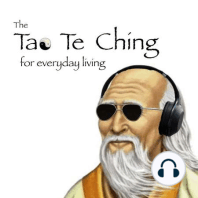25 min listen

Tao Te Ching Verse 44: Practicing Contentment
Tao Te Ching Verse 44: Practicing Contentment
ratings:
Length:
32 minutes
Released:
Jul 24, 2020
Format:
Podcast episode
Description
Tao Te Ching Verse 44translated by Lin YutangFame or one's own self, which does one love more?One's own self or material goods, which has more worth?Loss (of self) or possession (of goods), which is the greater evil?Therefore: those who love most spend most, Those who hoard much lose much.The contented person meets no disgrace;Who know when to stop run into no danger -They can long endure.Photo by Marcos Paulo Prado on UnsplashThose who love more spend more, Those who hoard more lose moreIsn’t spending really more fun than saving? For me it is. Of course I understand that saving money now helps safeguard against a significant disruption in my lifestyle later. So I do it. And to a certain extent, it’s nice to see some of that financial security in the bank. But it’s still way more fun to spend it, at least in my opinion. But what if we’re not talking exclusively about money here? Maybe we’re talking about spending love vs hoarding love? Maybe we’re talking about service to others! What is service but the outpouring of one’s own energy for the benefit of others? Further: what if by spending my own energy on others, I become more and more like that empty vessel into which the Tao may flow more and more? The contented shall know no disgraceWhen I’m still, when all is right with the world and me, I feel no need to change it. When I don’t need to change anything, there is nothing at stake. When I am not putting myself out there, there is no risk of failure, is there? But let’s not confuse this with doing the right thing - remember we talked about non-action as really the abstention of inserting our egos into things. If I am trying to make positive change in the world and do not attach to the outcome, I am still not putting myself at risk for feeling disgrace, am I? I am doing my part, I am honoring myself by not attaching. I am still content within.Who knows when to stop runs into no danger & can long endureI feel like knowing when to stop is a byproduct of contentment. So the obvious ones are knowing when to stop consuming things, when to stop in an argument, when to stop doing things. But what about knowing when to stop not doing things? Ignoring a certain circumstance because it’s not convenient - isn’t that not doing something, not to be confused with non-action? What about standing by and not addressing the elephant in the room? I’ve experienced some dire consequences from both cases. So for me, knowing when to stop is knowing when I am either doing or not doing something to serve my corporeal or egoistic desires, reexamining my motives, and adjusting accordingly so I can move into Harmony with the Tao. I feel like when my waters are calm and my dust is settled, it is easier for me to know when to stop. Tao Te Ching Verse 44 (Anonymous):What comes first, life or status?What's more important to you, yourself or your possessions?What's worse, having or losing?One who wants a lot pays a high priceOne who has a lot, has a lot to loseBut one who is satisfied knows neither fear nor disgraceAnd one who has stopped playing a part in the game will never be afraid again and will live happily ever after.
Released:
Jul 24, 2020
Format:
Podcast episode
Titles in the series (80)
Tao Te Ching Verse 3: Right-sizing Ambition by The Tao Te Ching for Everyday Living